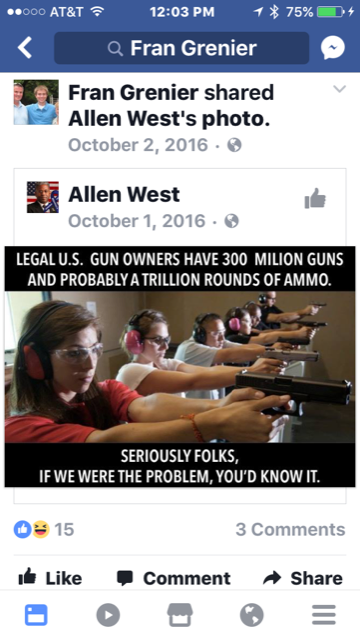Upon the 'No Common Ground' of Guns, a Behemoth Takes a Baby Step

In disputes over public policy, particularly those that arouse controversy and passion, the competing camps frequently invoke the need to identify “common ground,” a place where both parties can come together and reason through their differences.
It often succeeds if all involved embrace compromise, easing some of their demands while accepting some of those of their opponents.
When the issue is gun control, though, it is time to concede that “common ground” doesn’t exist.
The purists have controlled the debate, producing a paralysis in government during which outrage fades --- at least until the next mass shooting at a school, workplace, shopping mall, nightclub or public gathering spot.
While the debate over greater regulation of firearms purchases and ownership often starts on a hopeful note in the aftermath of a tragedy, stalemate develops quickly and inevitably concludes without action.
The opposing forces are entrenched in their positions and refuse to budge in any meaningful fashion.
The National Rifle Association, the leading gun rights advocacy group, mobilizes its considerable lobbying influence in Congress, warning that its financial and organizational clout will be turned against those who support additional restrictions or any measure which it considers an intrusion on individual rights to gun ownership.
Supporters of gun control proposals cannot compete with the NRA and have failed time and again to secure approval for any measures of consequence to prevent firearms from reaching the hands of those who shouldn’t have them.
Significantly, though, the private sector has now stepped in, substituting its judgment and decisions for the ongoing lack of congressional action.
The turning point seems to have been the killing of 31 people in two mass shootings over one weekend last month in El Paso, Tex., and Dayton, Ohio.
For instance, Walmart, the world’s largest retailer, announced it will cease selling handguns and some calibers of ammunition and Dick’s Sporting Goods will no longer sell firearms and ammunition in many of its stores.
Both were joined by Target and several pharmacies, convenience food outlets and supermarkets in asking that guns not be openly carried in their establishments.
The firearms manufacturer Colt announced it would cease the manufacture of the AR-15 semi-automatic rifle for civilian sale. It’s been estimated that nationally there are 16 million of these weapons in private hands, enough to arm every man, woman and child in New Jersey with an ample reserve stockpile.
Obviously, none of the steps taken by the private sector can legislate expanded background checks for weapons purchases or implement so-called red flag laws to permit law enforcement authorities, armed with a court order, to remove guns from those judged harmful to themselves or others.
Asking that customers refrain from openly carrying sidearms seems an eminently common sense step toward providing a comfortable environment. It is difficult for most to understand why a leisurely Saturday afternoon trip to Walmart should involve mom carrying coupons and dad strapping on a Glock nine.
The private sector involvement, may give some fence-straddling members of Congress pause to ponder the willingness of businesses to lead by example, accept whatever financial punishment results from their actions in return for speaking out in the face of gun violence.
The NRA’s reaction was predictable --- the companies had buckled under pressure from the media and liberal elites intent on undermining the Second Amendment.
Government, it said, should concentrate on mental health services and intervention along with acting to curb the easy availability of violent video games which it claimed are major contributing factors in mass shootings.
Focusing on restricting access to firearms, in the view of the NRA, is a dangerous step toward eventual confiscation, disarming the law abiding citizenry and paving the way to totalitarian rule.
The rights granted under the Second Amendment, the organization argues, are absolute even though court rulings have reinforced the authority of states to impose conditions on purchase and ownership.
There exists some optimism that legislation to expand background checks to include gun sales between private parties or through the internet will be looked upon more favorably in the current environment, thanks in some degree to the private sector actions. The proposal failed in the Senate two years ago in the wake of the murder of 20 first and second graders at a school in Newtown, Conn.
Closing loopholes in the system --- long a goal of advocates of increased regulations --- enjoys overwhelming public support, upwards of 80 per- cent in some surveys.
While President Donald Trump has been unclear concerning what actions his Administration would support, his Attorney General circulated a draft legislative proposal broadening the background check process, only to see the NRA attack it as a “non-starter” and warn that the President would offend a substantial segment of his base of support if he accepted it.
Senate Majority Leader Mitch McConnell has made it clear, however, that without a commitment from President Trump on what he supports, he will not schedule a vote on any gun control proposals. It’s the ultimate political cover --- protect his members from casting a politically risky vote in favor of controls only to see it rejected by the executive.
While the potential for continued stalemate and inaction remains very strong, the commercial behemoth Walmart may have just turned its colossal footprint into a baby step toward the elusive common ground.
Carl Golden is a senior contributing analyst with the William J. Hughes Center for Public Policy at Stockton University.






The Second Amendment does NOT grant rights, it affirms pre-existing rights and forbids government interference. "Shall not be infringed" could not be any clearer.